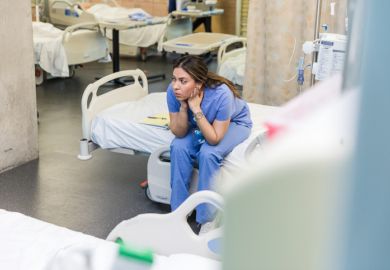A better understanding of the role of medicine within the Nazi regime would help strengthen medical students’ education and ethics, experts have said.
A new report on medical atrocities committed under Nazism and during the Holocaust, published by The Lancet Commission, details the central role health professionals played in the policies and practices of Adolf Hitler’s regime.
The report – written by a diverse and international group of 20 scholars, physicians and researchers – says that learning how and why such atrocities were enabled could empower future generations to face moral and ethical medical dilemmas and their own biases.
Sabine Hildebrandt of Boston Children’s Hospital and Harvard Medical School, the co-chair of the commission, said the evidence demonstrated how many health professionals were capable of committing ethical transgressions and even crimes against their patients under certain conditions and pressures.
“By learning about medicine’s role and health professionals’ behaviour under Nazism, they can further develop their own moral reasoning and stand up to abuses of power,” she said.
The commission said that the bodies of Nazi victims were used for research and teaching, with the Pernkopf anatomy atlas just one example of how Nazi research became part of the canon of medical knowledge.
And it said current understanding of aviation safety, hypothermia and even the effects of tobacco and alcohol use on the body was informed by research in the Nazi era, but awareness of how the research was obtained was scarce.
Shmuel Pinchas Reis of Hebrew University Hadassah Medical School, the co-chair of the commission, said accountability for and recognition that crimes were committed in the name of medicine in the Nazi era and during the Holocaust remained “woefully inadequate”.
“Medical students, researchers and practising health professionals should know where – and from whom – the foundations of medical knowledge come from,” he said.
“Victims of Nazism are owed that; they have a right to be honoured and treated with dignity in life and death for coerced contributions to medicine as we know it today.”
The report calls for the study of medicine, Nazism and the Holocaust to be incorporated into the curriculum for all medical students and health professionals.
It also says universities and other medical institutions should actively identify and commemorate victims of Nazi medical crimes and initiate research to better understand their direct connections to human rights violations in the past.
Register to continue
Why register?
- Registration is free and only takes a moment
- Once registered, you can read 3 articles a month
- Sign up for our newsletter
Subscribe
Or subscribe for unlimited access to:
- Unlimited access to news, views, insights & reviews
- Digital editions
- Digital access to THE’s university and college rankings analysis
Already registered or a current subscriber? Login








